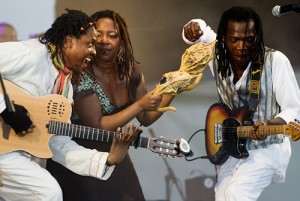Truth be told, when I define myself, nationality does not take precedence. From the time I was born, I was immersed in and shaped by my ethnicity. The language I speak, the traditions and values I keep, the history I’m rooted in and, to some extent, my way of thinking, are all affirmations of my primary identity as a Ndebele. I am part of the Nguni-speaking peoples of Africa – MaNdebele amahle, abakoMthwakazi, abondlela zimhlophe (The Beautiful Ndebele of Mthwakazi, for whom the paths are prosperous).
I wish that I could feel as deeply about my Zimbabwean-ess as I do for my being Ndebele. To some extent, being Zimbabwean is really a matter of fact for me – I was born here, I live here and I have the identity documents to prove it. Between the great house of stone and me, there is little cement.
Social science suggests that national symbols are key to building national pride and the strong identification of a group of individuals with their country. And therein lies the problem. Zimbabwe’s national symbols have elicited in me, by accident or design, everything else but.
Take for instance our national anthem. I grew up singing “Nkosi Sikelela”. By age three, I knew the tune. In primary school, I knew the words and was beginning to develop an appreciation of it. Then along came “Kalibusiswe Ilizwe leZimbabwe”. Our new anthem just failed to occupy the same spot. I have never connected to it and simply learning the words has been a chore I’d rather skip. I console myself with the fact that at least I know the tune, but more often than not, the tune I like to hum to myself is “Nkosi Sikelela”.
Then there’s our national flag. Ask me about the colours, the order that they lie in, what each stands for and I will answer correctly, thanks to my patient grade-four teacher. I respect our national flag, whether it is hanging at full or half-mast or being raised and lowered. Maybe, that’s the trouble. My relationship and interaction with the Zimbabwe flag is rigid and formal, especially when I compare it with the vivid images of Americans and South Africans draping and painting and dressing themselves in their respective banners. Perhaps, if we gave it a pet name like the Star Spangled Banner that would help to build a familiar and loving relationship.
Citizens of other nations also take great pride in their currencies. Botswana has the Pula, both for money and as a national slogan. And who can forget the British, who have such pride in their Pound Sterling that they have honoured it with a name and a surname. Unfortunately, when I remember the Zimbabwe Dollar and her cousin, the bearer cheque, it is the trauma of hyperinflation that stands out most. On the other, more positive hand, our suffering at the hands of a temperamental currency did serve to unite us in our misery.
I guess the reason why I’m troubled by my (lack of) patriotism is that I’m a person who always has a strong sense of loyalty and dedication to anything I belong to. I love my roots, my family, my religion and as trivial as it seems now, I even loved the canary-yellow of my schoolhouse. I really envy those who are devoted to and are prepared to serve their countries without question. I long for the day when I too will have a similar love for mine.










